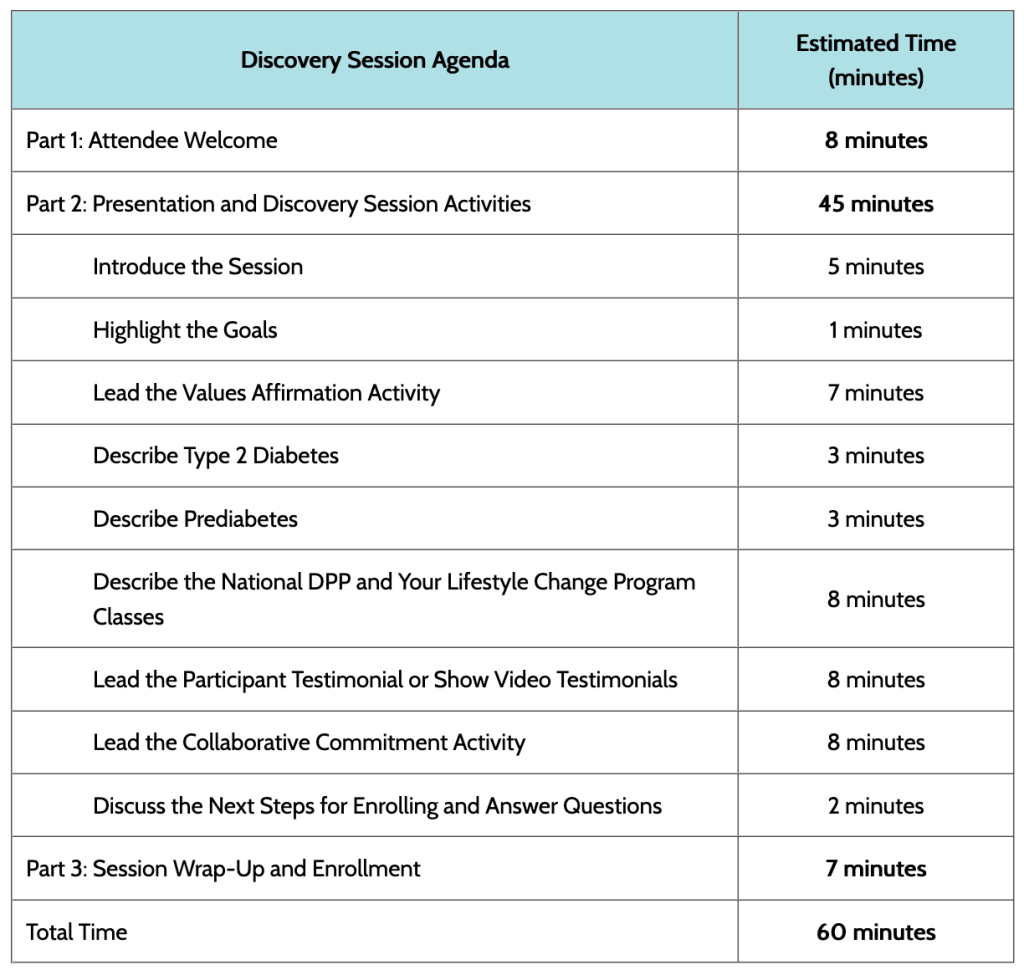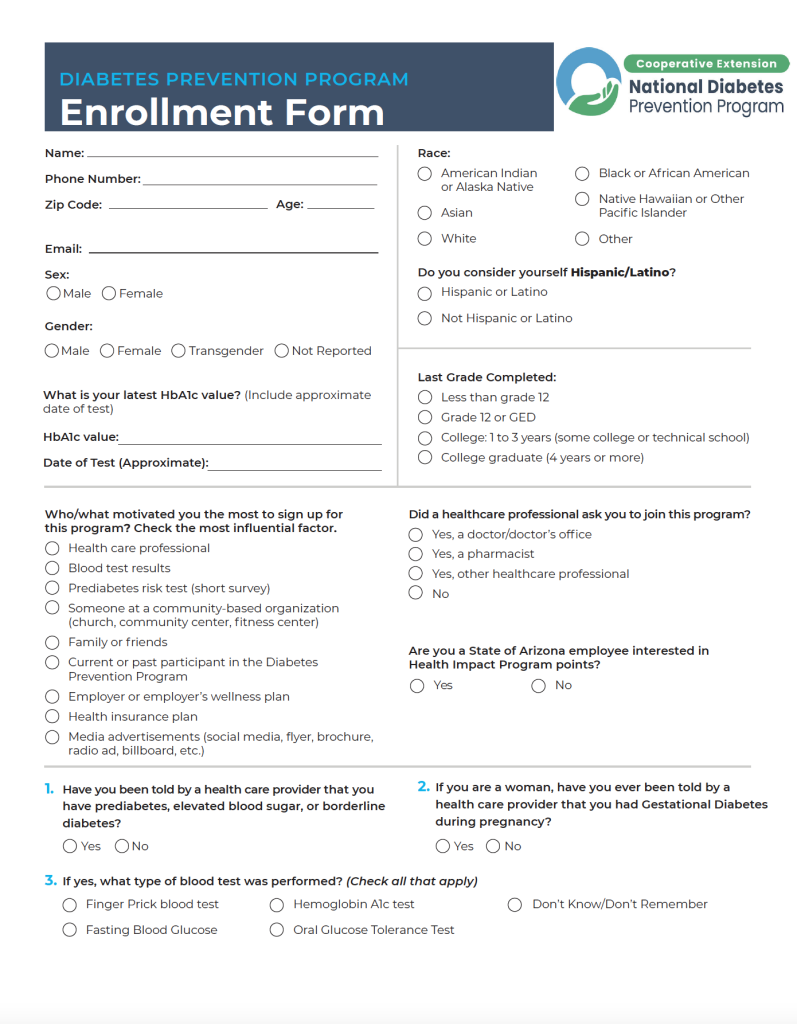Bringing Diabetes Prevention to Extension
Getting Started
The National Diabetes Prevention Program, a CDC-directed collaborative of public and private organizations to decrease diabetes prevalence, supports organizations adopting the program.
Assessing organizational capacity
Bringing the National DPP to your organization is a worthwhile effort, and should begin with understanding the requirements and assessing your organization capacity to meet these requirements. The National DPP has developed a tool to help with this process: Organizational Capacity Assessment for Applicant Organizations to the Centers for Disease Control and Prevention’s Diabetes
Getting administrative buy-in
Joining the National DPP and delivering the lifestyle change program in your state or county is a significant commitment and requires buy-in from Extension administration. You should engage them from the outset, providing them with evidence of the benefits of the program and fit within the mandates of Cooperative Extension. The CDC website provides valuable information and resources to help you make your case.
Why Offer a Lifestyle Change Program?
We have developed a one-pager that you can use as a template for your own state, to highlight the benefits of delivering the DPP lifestyle change program in your Extension organization.
Key points to make include:
- The lifestyle change program has a strong evidence base showing that it can cut risk of developing type 2 diabetes by 58% (71% for people over 60 years old).
- The lifestyle change program aligns with the Extension National Framework for Health (PDF), addresses a priority area of chronic disease prevention and control, and targets underserved at-risk populations thereby addressing health equity issues.
- Being part of the National DPP will increase the visibility of Cooperative Extension to the public and other public health organizations. CDC-recognized organizations providing the lifestyle change program are listed on the searchable CDC-website of lifestyle change program providers.
- Being part of the National DPP joins Cooperative Extension in a national effort to reduce diabetes prevalence. Impacts can be measured locally, nationally within the Cooperative Extension System, and collectively as part of the NDPP.
The resources found on the National DPP website will be an invaluable resource to you as you get started.
NDPP website: https://www.cdc.gov/diabetes/prevention/index.html
Marketing


Marketing Materials
The CDC provides promotional materials that can be easily modified to add your organization logo and contact information.
Materials include:
- Brochures
- Newspaper Ads
- Posters
- Post Cards
- Web Banners
Testimonial of Success
CDC Testimonials
Hear what real people are saying about their experiences with the DPP Lifestyle Change Program.


Extension Service Testimonials
Here are testimonials of the impact of the program within state Extension Services that have adopted the program.
Prediabetes risk test (English and Spanish)
This short questionnaire helps people to understand if they are at risk for having prediabetes. The definite diagnosis of prediabetes can only be done by a blood test.
Recruitment
Discovery Session (Session Zero)
Discovery Session (also known as Session Zero) is a 60-minute introductory session designed to help you recruit and enroll participants into your National DPP Lifestyle Change Program. This session may help potential participants understand what to expect in the program so they can determine their readiness to participate. Please note that Session Zero does not count as the first class session. Here is a sample agenda of the Discovery Session (Session Zero).
Useful Resources for Session Zero:
This guide provides step-by-step instructions, and supporting materials, for conducting Discovery Sessions when face-to-face meetings are not possible.

A Coach’s Perspective: CDC’S national Diabetes Prevention Program
Lisa’s Story: A Journey to the National Diabetes Prevention Program
Imagine: You and the National Diabetes Prevention Program
Enrollment Form
For enrollment, you need to collect information listed in the 2021 Diabetes Prevention Recognition Program (DRDP) Standards.
Click here to download a form you can use for your program. Simply add your Extension logo to the pdf.
Additional optional forms include:
- Participant’s Agreement Form
- Readiness Form

Delivering the Lifestyle Change Program
Lifestyle Change Curriculum
Using a CDC-approved curriculum is required for CDC recognition. Freely available curricula include:
- In early 2022, CDC launched the National Diabetes Prevention Program (National DPP) 2021 PreventT2 Curricula and Handouts.
- The 2012 Curriculum and original 2016 PreventT2 Curriculum, both available in English and Spanish, may also be used.
- The evidence–based Group Lifestyle BalanceTM program, adapted from the Diabetes Prevention Program (DPP), is designed to help individuals make lifestyle changes to both prevent diabetes and prevent or treat metabolic syndrome.
By using one of these curricula you can also be confident that you are covering core essentials of a lifestyle change program based on evidence-based behavior change strategies for positive outcomes.
Organizations may also use other curricula that have been approved by CDC or submit an alternative curriculum for review. You must choose one curriculum to use and notify the CDC if you change to a different curriculum or want to make adaptations to a CDC curriculum.
Allow for 4 to 6 weeks for the CDC to review a curriculum or adaptation. Details about curriculum requirements and the submission process are included in the Diabetes Prevention Recognition Program Standards and Operating Procedures (Section H; pages 9-12).
Modes of Delivery of the Lifestyle Change Program
CDC-recognized organizations may offer the program through any or all of the following delivery modes: in-person, distance learning, online, or combination. The organization must apply for an organizational code and submit data separately for each delivery mode offered. See the map for CE-NDPP organizations offering each mode.
In-person: 100% in-person for all participants by trained Lifestyle Coaches. Participants are physically present in a classroom or classroom-like setting. Organizations that conduct make-up sessions via a delivery mode other than in-person are still considered to be delivering the program in-person.
Distance Learning: delivered 100% by trained Lifestyle Coaches via remote classroom or telehealth. The Lifestyle Coach provides live delivery of session content in one location and participants call-in or video-conference from another location.
Most Extension organizations use this mode for virtual delivery and utilize Zoom, Teams, or other remote learning platforms
Online: 100% online for all participants. Participants log into course sessions via a computer, laptop, tablet, or smartphone. Participation is asynchronous, but the lifestyle coach must be available to participants for bi-direcitonal communication with each participant no less than once per week during the first six months and once per month during the second six months. Emails and text messages can count toward the requirement for live coach interaction as long as there is bi-directional communication. The organization must be able to track the participants’ progress through online course sessions.
Combination: delivered as a combination of any of the previously defined delivery modes for each individual participant by trained Lifestyle Coaches.
Personnel and Budget
Personnel needs
A well-trained workforce is essential to a successful diabetes prevention program. Organizations seeking CDC recognition are responsible to ensure they have adequately trained Program Coordinators and Lifestyle Coaches to conduct the CDC-approved curriculum.
Lifestyle Coach Training
To be eligible as a Lifestyle Coach, individuals must receive training of a minimum of 12 hours by either a training entity listed on the CDC website, a private organization with a national network of CDC-recognized program sites, a CDC-recognized virtual organization with national reach, OR a Master Trainer who has completed a Master Trainer program offered by a training entity on the CDC website. The most common way for Extension personnel to be trained as Lifestyle Coaches is through a training entity listed on the CDC website, or by a Master Trainer within their own organization.
CDC-recognized training entities
The CDC has specific organizations that have signed a Memorandum of Understanding to provide Lifestyle Coach training. The training by these organizations meets the CDC requirements of length and content. Depending on the organization, the training is offered in person at the organization or on site, as well as online. The organizations also offer ongoing support and continuing education for the Lifestyle Coaches that they train.Lifestyle Coaches are eligible to be trained as Master Lifestyle Coaches by these same organizations. Several Extension Services have chosen to train a Master Lifestyle Coach, and conduct their own training for Extension Lifestyle Coaches.
A list of the training organizations can be found on the CDC website:
Training for your Lifestyle Coaches
Master Trainer
Having a Lifestyle Coach who is trained as a Master Trainer allows an organization to train their own Lifestyle Coaches. Several of the training organizations listed on the CDC website also offer training for Master Trainers. To be eligible to become a Master Trainer, individuals must have received training as a Lifestyle Coach and have delivered at least three full cohorts of the lifestyle change program.
Annual professional development
The 2021 CDC Diabetes Prevention Recognition Program Standards require that Lifestyle Coaches and Program Coordinators complete at least two hours of Advanced Coach Training each year. The training must be provided by one of the training organizations listed on the National DPP Customer Service Center. Although the CDC is not collecting data on receipt of advanced lifestyle coach training, they reserve the right to audit CDC recognized organizations on the requirement. This requirement represents an added annual expense associated with maintaining a CDC Recognized Diabetes Prevention Program, as the majority of organizations charge a registration fee for their advanced lifestyle coach training.
Budget
There are costs associated with adoption of the Lifestyle Change Program that should be considered when considering adopting the program. There are initial start-up costs, and ongoing program costs. These will vary between state Extension Services. Some common costs to consider are outlined below.
Start-up (initial one-time costs)
- Training registration cost per lifestyle coach (~$500 to $800)
- Lifestyle coach travel to training (if applicable)
- Software for data management (optional)
- Body weight scales (for in-person programs, one per lifestyle coach)
- Printing of participant educational materials
Other one-time costs (not needed until program is more established)
- Master trainer initial training (~$1700)
- Master trainer travel to training
Recurring
- Personnel salaries (lifestyle coaches, data manager, program coordinator, specialist or administrator, as applicable)
- Software for data management annual fee (~$500 – 1500 depending upon software and number of organizational codes registered with CDC).
- Annual master trainer fee ($600, if applicable)
- Advanced lifestyle coach training ($60-80 per lifestyle coach, per year)
- Recruitment costs (printing, social media, advertising fees)
- Participant supplies/materials
- Printing
- Incentives (optional, i.e. water bottles, resistance bands, lunch boxes)
- Transportation support (optional)
- Child care during sessions (optional)
This online calculator can help you estimate your budgeting needs. Click here for a quick tutorial using an Extension DPP lifestyle change program as an example.
